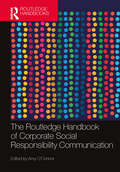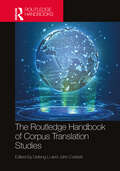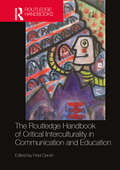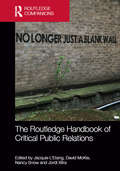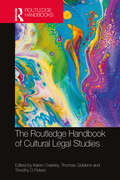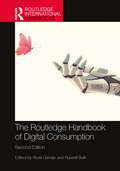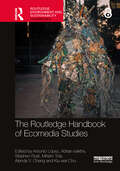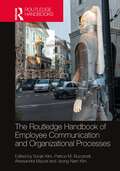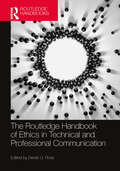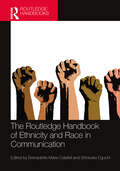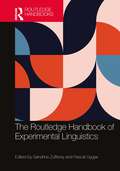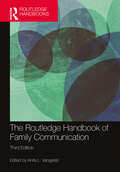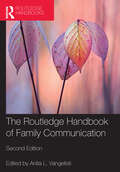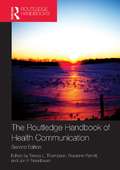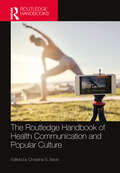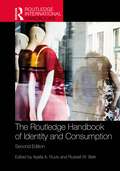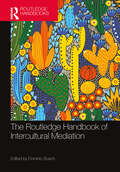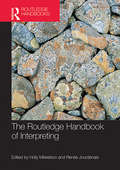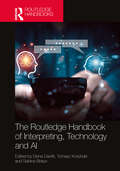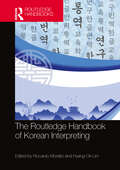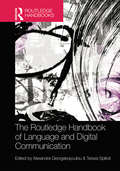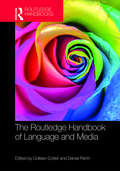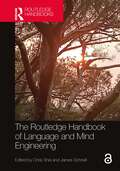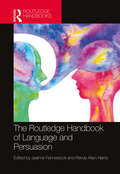- Table View
- List View
The Routledge Handbook of Corporate Social Responsibility Communication (Routledge Handbooks in Communication Studies)
by Amy O’ConnorThis handbook is a resource for students, faculty, and researchers who are focused on understanding the role communication plays in the formation and execution of corporate social responsibility (CSR) activities. Bringing together authors who are thought-leaders and emerging scholars from diverse theoretical and methodological perspectives, it examines the issues central to CSR communication including: theoretical underpinnings, form and content of CSR messaging, the boundaries of engagement, and the tensions associated with CSR communication. It offers a unique combination of functional and formative approaches to CSR communication designed to expose readers to a blend of approaches. With attention to issues of diversity, equity, and inclusion, this handbook also explicitly addresses recent societal changes and how those changes will impact CSR communication research and practices in the future. Offering both a strong introduction to topics for novices as well as a more advanced interrogation of CSR communication for more knowledgeable readers, the handbook is appropriate for advanced students and researchers in public relations, strategic communication, organizational communication, and allied fields.
The Routledge Handbook of Corpus Translation Studies (Routledge Handbooks in Translation and Interpreting Studies)
by Defeng Li and John CorbettThis Handbook offers a comprehensive grounding in key issues of corpus-informed translation studies, while showcasing the diverse range of topics, applications, and developments of corpus linguistics.In recent decades there has been a proliferation of scholarly activity that applies corpus linguistics in diverse ways to translation studies (TS). The relative ease of availability of corpora and text analysis programs has made corpora an increasingly accessible and useful tool for practising translators and for scholars and students of translation studies. This Handbook first provides an overview of the discipline and presents detailed chapters on specific areas, such as the design and analysis of multilingual corpora; corpus analysis of the language of translated texts; the use of corpora to analyse literary translation; corpora and critical translation studies; and the application of corpora in specific fields, such as bilingual lexicography, machine translation, and cognitive translation studies. Addressing a range of core thematic areas in translation studies, the volume also covers the role corpora play in translator education and in aspects of the study of minority and endangered languages. The authors set the stage for the exploration of the intersection between corpus linguistics and translation studies, anticipating continued growth and refinement in the field.This volume provides an essential orientation for translators and TS scholars, teachers, and students who are interested in learning the applications of corpus linguistics to the practice and study of translation.
The Routledge Handbook of Critical Interculturality in Communication and Education (New Perspectives on Teaching Interculturality)
by Fred DervinThis Handbook is the first comprehensive volume to focus entirely on the notion of interculturality, reflecting on what the addition of the adjective 'critical' means for research and teaching in interdisciplinary studies.The book consists of 35 chapters, including a comprehensive introduction and conclusion. It aims to present current debates on critical interculturality and to help readers make sense of what the label implies and entails in global and local contexts, especially (where possible) beyond dominant scholarship and pedagogical practices. The chapters interrogate the use of terms in different languages to discuss interculturality, drawing on recent literature from as many different parts of the world as possible. Some contributors also problematise their own autobiographical engagement with critical interculturality in their chapters.The book will be of interest to Master's and PhD students in education, communication, and intercultural studies who wish to develop their knowledge of critical interculturality. Established researchers in these fields will also benefit from this invaluable and original source of essential reading.
The Routledge Handbook of Critical Public Relations (Routledge Companions in Business, Management and Accounting)
by Nancy Snow Jacquie L'Etang David McKie Jordi XifraCritical theory has a long history, but a relatively recent intersection with public relations. This ground-breaking collection engages with commonalities and differences in the traditions, whilst encouraging plural perspectives in the contemporary public relations field. Compiled by a high-profile and widely respected team of academics and bringing together other key scholars from this field and beyond, this unique international collection marks a major stage in the evolution of critical public relations. It will increasingly influence how critical theory informs public relations and communication. The collection takes stock of the emergence of critical public relations alongside diverse theoretical traditions, critiques and actions, methodologies and future implications. This makes it an essential reference for public relations researchers, educators and students around a world that is becoming more critical in the face of growing inequality and environmental challenges. The volume is also of interest to scholars in advertising, branding, communication, consumer studies, cultural studies, marketing, media studies, political communication and sociology.
The Routledge Handbook of Cultural Legal Studies
by Thomas Giddens Karen Crawley Timothy D PetersThis handbook provides a comprehensive introduction to the cutting-edge field of cultural legal studies.Cultural legal studies is at the forefront of the legal discipline, questioning not only doctrine or social context, but how the concerns of legality are distributed and encountered through a range of material forms. Growing out of the interdisciplinary turn in critical legal studies and jurisprudence that took place in the latter quarter of the 20th century, cultural legal studies exists at the intersection of a range of traditional disciplinary areas: legal studies, cultural studies, literary studies, jurisprudence, media studies, critical theory, history, and philosophy. It is an area of study that is characterised by an expanded or open-ended conception of what ‘counts’ as a legal source, and that is concerned with questions of authority, legitimacy, and interpretation across a wide range of cultural artefacts. Including a mixture of established and new authors in the area, this handbook brings together a complex set of perspectives that are representative of the current field, but which also address its methods, assumptions, limitations, and possible futures.Establishing the significance of the cultural for understanding law, as well as its importance as a potential site for justice, community, and sociality in the world today, this handbook is a key reference point both for those working in the cultural legal context – in legal theory, law and literature, law and film/television, law and aesthetics, cultural studies, and the humanities generally – as well as others interested in the interactions between authority, culture, and meaning.
The Routledge Handbook of Digital Consumption (Routledge International Handbooks)
by Rosa Llamas Russell BelkSince the publication of the ground-breaking first edition, there has been an exponential growth in research and literature about the digital world and its enormous potential benefits and threats. Fully revised and updated, this new edition brings together an expertly curated and authoritative overview of the impact and emerging horizons of digital consumption. Divided into sections, it addresses key topics including digital entertainment, self-representation, communication, Big Data, digital spirituality, online surveillance, and algorithmic advertising. It explores developments such as consumer data collection techniques, peer-to-peer payment systems, augmented reality, and AI-enhanced consumer well-being, as well as digital transgression, secrecy, crypto-currencies, NFTs, and cultural concerns such as the spread of conspiracy theories and fake news. From digital influencers, digital nomads, and digital neo-tribalism to robots and cyborgs, it explores existences that blur boundaries between humans and machines, reality and the metaverse, and the emerging "technoculture" – a state of all-encompassing digital being. This unique volume is an essential resource for scholars, practitioners, and policy makers, and will continue to provide a new generation of readers with a deep understanding of the universe of digital consumption.
The Routledge Handbook of Ecomedia Studies (Routledge Environment and Sustainability Handbooks)
by Miriam Tola Stephen Rust Adrian Ivakhiv Alenda Y. Chang Antonio López Kiu-Wai ChuThe Routledge Handbook of Ecomedia Studies gathers leading work by critical scholars in this burgeoning field. Redressing the lack of environmental perspectives in the study of media, ecomedia studies asserts that media are in and about the environment, and environments are socially and materially mediated. The book gives form to this new area of study and brings together diverse scholarly contributions to explore and give definition to the field. The Handbook highlights five critical areas of ecomedia scholarship: ecomedia theory, ecomateriality, political ecology, ecocultures, and eco-affects. Within these areas, authors navigate a range of different topics including infrastructures, supply and manufacturing chains, energy, e-waste, labor, ecofeminism, African and Indigenous ecomedia, environmental justice, environmental media governance, ecopolitical satire, and digital ecologies. The result is a holistic volume that provides an in-depth and comprehensive overview of the current state of the field, as well as future developments. This volume will be an essential resource for students, educators, and scholars of media studies, cultural studies, film, environmental communication, political ecology, science and technology studies, and the environmental humanities.
The Routledge Handbook of Ecomedia Studies (Routledge Environment and Sustainability Handbooks)
by Miriam Tola Stephen Rust Adrian Ivakhiv Alenda Y. Chang Antonio López Kiu-Wai ChuThe Routledge Handbook of Ecomedia Studies gathers leading work by critical scholars in this burgeoning field. Redressing the lack of environmental perspectives in the study of media, ecomedia studies asserts that media are in and about the environment, and environments are socially and materially mediated.The book gives form to this new area of study and brings together diverse scholarly contributions to explore and give definition to the field. The Handbook highlights five critical areas of ecomedia scholarship: ecomedia theory, ecomateriality, political ecology, ecocultures, and eco-affects. Within these areas, authors navigate a range of different topics including infrastructures, supply and manufacturing chains, energy, e-waste, labor, ecofeminism, African and Indigenous ecomedia, environmental justice, environmental media governance, ecopolitical satire, and digital ecologies. The result is a holistic volume that provides an in-depth and comprehensive overview of the current state of the field, as well as future developments.This volume will be an essential resource for students, educators, and scholars of media studies, cultural studies, film, environmental communication, political ecology, science and technology studies, and the environmental humanities.The Open Access version of this book, available at www.taylorfrancis. com, has been made available under a Creative Commons Attribution-Non Commercial-No Derivatives (CC-BY-NC-ND) 4.0 license. Deep gratitude for the generous support of those institutions that provided funding to enable this volume to be available simultaneously in print and open access: University of Oregon Libraries Open Access Publishing Award, Frank J. Guarini School of Busi-ness at John Cabot University, University of Vermont Humanities Center, University of California Santa Barbara, University of Lausanne, and School of Humanities at Nanyang Technological University.
The Routledge Handbook of Employee Communication and Organizational Processes (Routledge Studies in Communication, Organization, and Organizing)
by Patrice M. Buzzanell Jeong-Nam Kim Soojin Kim Alessandra MazzeiThis Routledge Handbook takes a truly global and multidisciplinary approach to exploring all facets of employee communication.Beginning with two key disciplinary approaches—organizational communication and public relations—scholars capture and define employee communication from both perspectives, addressing commonalities and bridging disciplinary differences. This volume places importance on the everyday communicative behaviors by internal members such as leaders, managers, inter/generational cohorts, employees, and those working on behalf of organizations, such as social media influencers, and on expansive conceptualizations of employee communication such as chatbots, environment, and global supply chain members involved in organizing. With a focus on employees in situ, the authors respond to these key questions: in what ways is employee communication relevant today? What does employee communication entail? How, why, and to what extent does employee communication influence or become influenced by organizational processes?Investigating antecedents, organizational contexts and processes, and consequences of employee communication, and offering key theoretical information and empirically driven recommendations for practice, this handbook will be an essential resource for students, researchers, and industry practitioners in employee communication, organizational communication, business and management, leadership communication, and public relations more generally.
The Routledge Handbook of Ethics in Technical and Professional Communication (Routledge Handbooks in Communication Studies)
by Derek G. RossFeaturing specially commissioned chapters from scholars and practitioners across the field, this handbook serves as a touchstone for those who wish to do ethical technical and professional communication in its myriad forms.Offering an overview of what “ethics” in technical and professional communication looks like, what “being ethical” entails, and what it means to “do ethical work,” this handbook is divided into five interrelated parts and an Afterword: Why Ethics? Foundations: What Are Ethics, and How Do They Fit into Technical and Professional Communication? Local Application: What Does “Being Ethical” Mean to the Individual? Institutional Application: What Does “Being Ethical” Mean at the Institutional Level? The Future of Ethics in Technical Communication: What Happens Next? The first of its kind, this accessibly written handbook explores descriptive, normative, applied, and meta-ethics. It will be an indispensable resource for researchers and students in the fields of Technical and Professional Communication, Writing Studies, Rhetoric, and Design.
The Routledge Handbook of Ethnicity and Race in Communication (Routledge Handbooks in Communication Studies)
by Bernadette Marie Calafell Shinsuke EguchiA much-needed text that takes stock of issues of ethnicity and race in communication studies, this book presents an overview of the most cutting-edge research, theory, and methods in the subject and advocates for centering ethnicity and race in the communication studies discipline. This handbook brings together a diverse group of both senior and up-and-coming scholars to offer original scholarship in race and ethnicity in communication studies, emphasizing various analytical perspectives including, but not limited to, global, transnational, diasporic, feminist, queer, trans, and disability approaches. While centering ethnicity and race, contributors also take an intersectional perspective in their approach to their topics and chapters. The book features examination of specific subfields, like Whiteness studies, Latina/o/x communication studies, Asian/Pacific American communication studies, African American communication and culture, and Middle East and North African communication studies. The text is oriented to graduate students and researchers within communication studies as well as media studies, cultural studies, critical race and ethnic studies, American studies, sociology, and education, while still being accessible to upper-level undergraduate students.
The Routledge Handbook of Experimental Linguistics (Routledge Handbooks in Linguistics)
by Sandrine Zufferey Pascal GygaxThe Routledge Handbook of Experimental Linguistics provides an up-to-date and accessible overview of various ways in which experiments are used across all domains of linguistics and surveys the range of state-of-the-art methods that can be applied to analyse the language of populations with a wide range of linguistic profiles. Each chapter provides a step-by-step introduction to theoretical and methodological challenges and critically presents a wide range of studies in various domains of experimental linguistics. This handbook: • Provides a unified perspective on the data, methods and findings stemming from all experimental research in linguistics • Covers many different subfields of linguistics, including argumentation theory, discourse studies and typology • Provides an introduction to classical as well as new methods to conduct experiments such as eye tracking and brain imaging • Features a range of internationally renowned academics • Shows how experimental research can be used to study populations with various linguistic profiles, including young children, people with linguistic impairments, older adults, language learners and bilingual speakers Providing readers with a wealth of theoretical and practical information in order to guide them in designing methodologically sound linguistic experiments, this handbook is essential reading for scholars and students researching in all areas of linguistics.
The Routledge Handbook of Family Communication (ISSN)
by Anita L. VangelistiThis third edition again brings together interdisciplinary contributions to provide a comprehensive and multifaceted resource that reflects the breadth and depth of research on family communication and family relationships.Chapters continue to address theoretical and methodological issues influencing current conceptions of family and cover communication occurring in a variety of family forms and across social, cultural, and physical contexts.This third edition includes key updates, such as: The use and influence of social media and technology in families Parenting and communication in culturally and structurally diverse families Communication and physical health of family members Managing personal information about difficult topics in families The influence of the COVID-19 pandemic on family members This handbook is ideal for students and researchers interested in interpersonal and family communication, relationships, and family therapy within the disciplines of communication, social psychology, clinical psychology, sociology, and family studies.
The Routledge Handbook of Family Communication (Routledge Communication Series)
by Anita L. VangelistiWith a synthesis of research on issues key to understanding family interaction, as well as an analysis of many theoretical and methodological choices made by researchers studying family communication, the Handbook serves to advance the field by reframing old questions and stimulating new ones. The contents are comprised of chapters covering: theoretical and methodological issues influencing current conceptions of family; research and theory centering around the family life course communication occurring in a variety of family forms individual family members and their relationships dynamic communication processes taking place in families family communication embedded in social, cultural, and physical contexts. Key changes to the second edition include: updates throughout, providing a thorough and up-to-date overview of research and theory new topics reflecting the growth of the discipline, including chapters on "singles" as family members, emerging adults, and physiology and physical health. Highlighting the work of scholars across disciplines--communication, social psychology, clinical psychology, sociology, family studies, and others--this volume captures the breadth and depth of research on family communication and family relationships. The well-known contributors approach family interaction from a variety of theoretical perspectives and focus on topics ranging from the influence of structural characteristics on family relationships to the importance of specific communication processes.
The Routledge Handbook of Health Communication (Routledge Communication Series)
by Teresa L. Thompson Jon F. Nussbaum Roxanne ParrottThe Routledge Handbook of Health Communication brings together the current body of scholarly work in health communication. With its expansive scope, it offers an introduction for those new to this area, summarizes work for those already learned in the area, and suggests avenues for future research on the relationships between communicative processes and health/health care delivery. This second edition of the Handbook has been organized to reflect the goals of health communication: understanding to make informed decisions and to promote formal and informal systems of care linked to health and well-being. It emphasizes work in such areas as barriers to disclosure in family conversations and medical interactions, access to popular media and advertising, and individual searches online for information and support to guide decisions and behaviors with health consequences. This edition also adds an overview of methods used in health communication and the unique challenges facing health communication researchers applying traditional methods to efforts to gain reliable and valid evidence about the role of communication for health. It introduces the promise of translational research being conducted by health communication researchers from multiple disciplines to form transdisciplinary theories and teams to increase the well-being of not only humans but the systems of care within their nations. Arguably the most comprehensive scholarly resource available for study in this area, the Routledge Handbook of Health Communication serves an invaluable role and reference for students, researchers, and scholars doing work in health communication.
The Routledge Handbook of Health Communication and Popular Culture (Routledge Handbooks in Communication Studies)
by Christina S. BeckThe Routledge Handbook of Health Communication and Popular Culture offers rich insights into the ways in which communication about health through popular culture can become a part of healing, wellness, and health-related decisions.This Handbook allows readers to understand and consider messages that inform and influence health-related choices through pop culture in the public sphere. Written in an accessible narrative style and including interdisciplinary, global, and diverse perspectives, a vast team of contributing authors from the field explores the intersections between health communication and popular culture. The Handbook is divided into five parts: Framing of Health-Related Issues in Popular Culture; Exploring Popular Culture Influences on Health Behaviors and Beliefs; Considering Pro-Social Public Health Interventions in Popular Culture; Understanding Health Issues in Popular Culture from Diverse Perspectives; and Pop Culture and Health Communication: Looks to the Future.The Handbook will be of interest to students and scholars in the fields of Communication Studies, Health Communication, Public Health Policy, Media Literacy, and Cultural Studies.
The Routledge Handbook of Identity and Consumption (Routledge International Handbooks)
by Russell W. Belk Ayalla A. Ruvio"Tell me what you eat, I'll tell you who you are," said Anthelme Brillat-Savarin. Today, "You are what you consume" is more apt. Barbara Krueger’s ironic twist of Descartes – "I shop therefore I am" – has lost its irony. Such phrases have become commonplace descriptions of our identity in the contemporary world. In our materialistic world, it seems as if there is no debate that our consumption behavior is fused with our self-identity – shaping it, changing it, and often challenging it.The Routledge Handbook of Identity and Consumption introduces the reader to state-of-the-art research, written by the world’s leading scholars regarding the interplay between identity and consumption. The book addresses the diverse issues regarding the ways identity affects our consumption behaviour and vice-versa and in doing so presents a broad perspective on the dynamics of self-identity and consumption.With chapters discussing the theory, research, and practical implications of these dynamics, including the way they change across our life span and their expression within different social, cultural, and religious contexts, this book will be a valuable reference source for students and academics from a variety of disciplines.
The Routledge Handbook of Intercultural Mediation (Routledge Handbooks in Communication Studies)
by Dominic BuschOffering unique coverage of an emerging, interdisciplinary area, this comprehensive handbook examines the theoretical underpinnings and emergent conceptions of intercultural mediation in related fields of study. Authored by global experts in fields from intercultural communication and conflict resolution to translation studies, literature, political science, and foreign language teaching, chapters trace the history, development, and present state of approaches to intercultural mediation. The sections in this volume show how the concept of intercultural mediation has been constructed among different fields and shaped by its specific applications in an open cycle of influence. The book parses different philosophical conceptions as well as pragmatic approaches, providing ample grounding in the key perspectives on this growing field of discourse. The Routledge Handbook of Intercultural Mediation is a valuable reference for graduate and postgraduate students studying mediation, conflict resolution, intercultural communication, translation, and psychology, as well as for practitioners and researchers in those fields and beyond.
The Routledge Handbook of Interpreting (Routledge Handbooks in Applied Linguistics)
by Holly Mikkelson Renée JourdenaisThe Routledge Handbook of Interpreting provides a comprehensive survey of the field of interpreting for a global readership. The handbook includes an introduction and four sections with thirty one chapters by leading international contributors. The four sections cover: The history and evolution of the field The core areas of interpreting studies from conference interpreting to interpreting in conflict zones and voiceover Current issues and debates from ethics and the role of the interpreter to the impact of globalization A look to the future Suggestions for further reading are provided with every chapter. The Routledge Handbook of Interpreting is an essential reference for researchers and advanced students of interpreting.
The Routledge Handbook of Interpreting, Technology and AI (Routledge Handbooks in Translation and Interpreting Studies)
by Sabine Braun Elena Davitti Tomasz KorybskiThis handbook provides a comprehensive overview of the history, development, use, and study of the evolving relationship between interpreting and technology, addressing the challenges and opportunities brought by advances in AI and digital tools.Encompassing a variety of methods, systems, and devices applied to interpreting as a field of practice as well as a study discipline, this volume presents a synthesis of current thinking on the topic and an understanding of how technology alters, shapes, and enables the interpreting task. The handbook examines how interpreting has evolved through the integration of both purpose-built and adapted technologies that support, automate, or even replace (human) interpreting tasks and offers insights into their ethical, practical, and socio-economic implications. Addressing both signed and spoken language interpreting technologies, as well as technologies for language access and media accessibility, the book draws together expertise from varied areas of study and illustrates overlapping aspects of research.Authored by a range of practicing interpreters and academics from across five continents, this is the essential guide to interpreting and technology for both advanced students and researchers of interpreting and professional interpreters.
The Routledge Handbook of Korean Interpreting (Routledge Handbooks in Translation and Interpreting Studies)
by Riccardo Moratto Hyang-Ok LimProfessor Riccardo Moratto and Professor Hyang-Ok Lim bring together the most authoritative voices on Korean interpreting. The first graduate school of interpretation and translation was established in 1979 in South Korea. Since then, not only has the interpretation and translation market grown exponentially, but so too has research in translation studies. Though the major portion of research focuses on translation, interpretation has not only managed to hold its own, but interpretation studies in Korea have been a pioneer in this field in Asia. This handbook highlights the main interpretation research trends in South Korea today, including case studies of remote interpreting during the Covid-19 pandemic, Korean interpreting for conferences, events, and diplomacy, and research into educating interpreters effectively. An essential resource for researchers in Korean interpreting, this handbook will also be very valuable to those working with other East Asian languages.
The Routledge Handbook of Language and Digital Communication (Routledge Handbooks in Applied Linguistics)
by Alexandra Georgakopoulou Tereza SpiliotiThe Routledge Handbook of Language and Digital Communication provides a comprehensive, state of the art overview of language-focused research on digital communication, taking stock and registering the latest trends that set the agenda for future developments in this thriving and fast moving field. The contributors are all leading figures or established authorities in their areas, covering a wide range of topics and concerns in the following seven sections: • Methods and Perspectives; • Language Resources, Genres, and Discourses; • Digital Literacies; • Digital Communication in Public; • Digital Selves and Online-Offline Lives; • Communities, Networks, Relationships; • New debates and Further directions. This volume showcases critical syntheses of the established literature on key topics and issues and, at the same time, reflects upon and engages with cutting edge research and new directions for study (as emerging within social media). A wide range of languages are represented, from Japanese, Greek, German and Scandinavian languages, to computer-mediated Arabic, Chinese and African languages. The Routledge Handbook of Language and Digital Communication will be an essential resource for advanced undergraduates, postgraduates and researchers within English language and linguistics, applied linguistics and media and communication studies.
The Routledge Handbook of Language and Media
by Colleen Cotter Daniel PerrinThe Routledge Handbook of Language and Media provides an accessible and comprehensive overview of state-of-the-art research in media linguistics. This handbook analyzes both language theory and practice, demonstrating the vital role of this research in understanding language use in society. With over thirty chapters contributed by leading academics from around the world, this handbook: addresses issues of language use, form, structure, ideology, practice, and culture in the context of both traditional and new communication media; investigates mediated language use in public spheres, organizations, and personal communication, including newspaper journalism, broadcasting, and social media; examines the interplay of language and media from both linguistic and media perspectives, discussing auditory and visual media and graphic modes, as well as language and gender, multilingualism, and language change; analyzes the advantages and shortcomings of current approaches within media linguistics research and outlines avenues for future research. The Routledge Handbook of Language and Media is a must-have survey of this key field, and is essential reading for those interested in media linguistics.
The Routledge Handbook of Language and Mind Engineering
by Chris Shei James SchnellThe Routledge Handbook of Language and Mind Engineering is a comprehensive work that delves into the complex interplay between language, culture, politics, and media in shaping the human mind.The book is divided into five main sections, each exploring different aspects of mind engineering: I. Political Mind Engineering; II. Commercial Mind Engineering; III. Media, Culture, and Mind Engineering; IV. Linguistic and Semiotic Analysis of Mind Engineering; V. Mind Engineering in Educational Settings.The book provides a multi-dimensional perspective on how language, media, culture, and politics intersect to shape individuals' thoughts and beliefs. It highlights the diverse methods and contexts in which mind engineering occurs, making it a valuable resource for scholars, researchers, and policymakers interested in understanding the complexities of contemporary discourse and manipulation of human thought.The contents of this cutting-edge handbook will engage all undergraduate, postgraduate, PhD students and scholars, and researchers at all levels, in fields such as languages, linguistics, politics, communication studies, media studies, and psychology.Chapter 15 of this book is freely available as a downloadable Open Access PDF at http://www.taylorfrancis.com under a Creative Commons Attribution (CC-BY) International license.Chapter 17 of this book is freely available as a downloadable Open Access PDF at http://www.taylorfrancis.com under a Creative Commons Attribution‑Non Commercial‑No Derivatives (CC‑BY‑NC‑ND) 4.0 license.Chapter 18 of this book is freely available as a downloadable Open Access PDF at http://www.taylorfrancis.com under a Creative Commons Attribution-Non Commercial-No Derivatives (CC-BY-NC-ND) 4.0 license.
The Routledge Handbook of Language and Persuasion (Routledge Handbooks in Linguistics)
by Randy Allen Harris Jeanne FahnestockThis handbook provides a wide-ranging, authoritative, and cutting-edge overview of language and persuasion. Featuring a range of international contributors, the handbook outlines the basic materials of linguistic persuasion – sound, words, syntax, and discourse – and the rhetorical basics that they enable, such as appeals, argument schemes, arrangement strategies, and accommodation devices. After a comprehensive introduction that brings together the elements of linguistics and the vectors of rhetoric, the handbook is divided into six parts. Part I covers the basic rhetorical appeals to character, the emotions, argument schemes, and types of issues that constitute persuasion. Part II covers the enduring effects of persuasive language, from humor to polarization, while a special group of chapters in Part III examines figures of speech and their rhetorical uses. In Part IV, contributors focus on different fields and genres of argument as entry points for research into conventions of arguing. Part V examines the evolutionary and developmental roots of persuasive language, and Part VI highlights new computational methods of language analysis. This handbook is essential reading for those researching and studying persuasive language in the fields of linguistics, rhetoric, argumentation, communication, discourse studies, political science, psychology, digital studies, mass media, and journalism.
